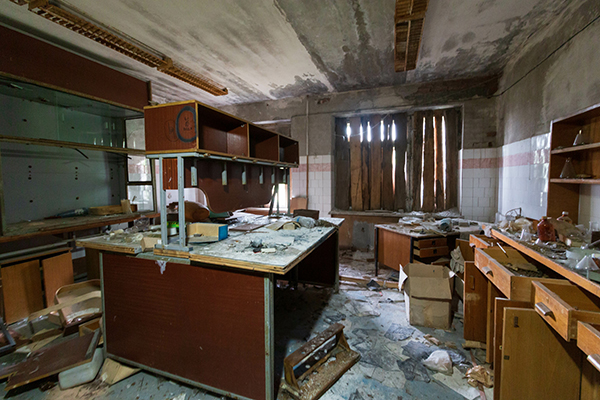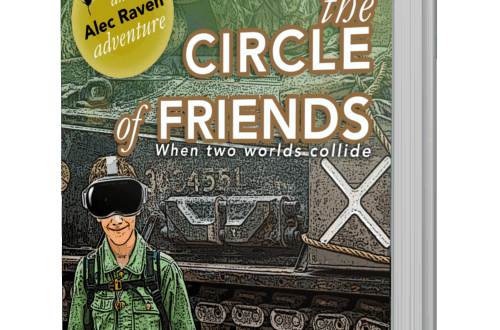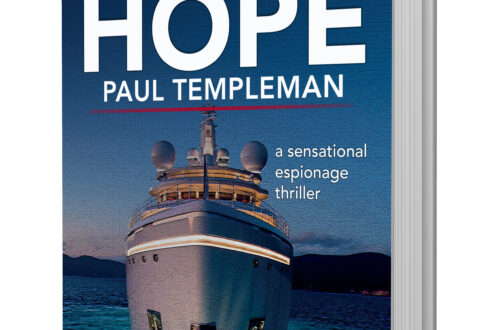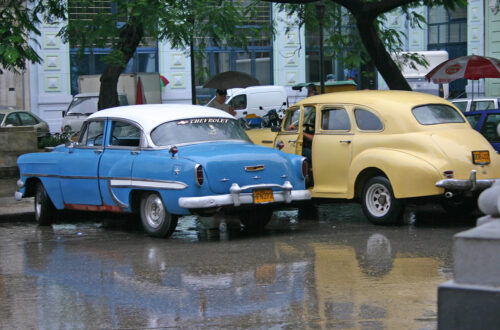‘Is it far?’
‘Who knows? I wasn’t even sure this road existed. No signs. Sometimes there are roads on maps that were planned but never built. Other times there are roads like this that aren’t on any maps. At least the road’s here. But Sorsk Gorod? That’s not on any map. If it ever existed then we’ll find it. Trust me.’ And she did.
The road swept around to the left, and afterwards there was an abandoned checkpoint, with rusted red and white poles standing upright and two guard houses with empty windows. Grigor sped through the gates and the road widened into two carriageways again. The surface was surprisingly smooth, although the central reservation was overgrown. Brown tentacles crusted with fresh snow, tumbled over the outside lane.
‘Like a highway,’ he said in disbelief, accelerating. ‘Without any traffic. But some tracks in the snow. Look.’ He nodded, and there ahead of them was a single set of tyre-tracks. ‘Seems like at least one other car came this way today.’
The snow had begun to assert itself, and seemed to close in around them so it was like travelling in a gauze bubble, landscape a streak of brittle-backed frozen fields and leaden skies, a blur of snowflakes. She shivered, even though it was warm in the car, huddled into the folds of her coat.
‘Soon,’ he said, turning his head briefly. ‘Maybe,’ he qualified.
They drove for another hour on the straight road, and Kate dozed again. She awoke with a start when she sensed the motion of the car had stopped. ‘Are we there yet?’ Like a child’s refrain, she thought.
Ahead was a checkpoint, this time occupied. The road had narrowed to a single lane each way and there was a guard house on each lane. Barriers barred the route in both directions. At the side of the road there was a parking area, and a battered Lada with a blue light was parked at an angle taking up two spaces. Above the checkpoint hung a sign pronouncing ‘SORSK GOROD’.
‘Looks promising,’ said Grigor.
They edged forward, snow crunching under the wheels, and a uniformed guard emerged, adjusting his fur cap with one hand and swinging an automatic weapon over his shoulder with the other. In front of the barrier he raised his hand. A crooked yellow sign at the side of the road read ‘Contaminated Territory. Access Prohibited’.
‘Contaminated?’ she said.
With a creak of leather and a burst of cold air, Grigor manoeuvred himself out of the car. ‘Wait here.’
When Grigor approached him the guard unslung his weapon and pointed the barrel at him, then yelled something Kate couldn’t hear. Grigor walked with his palms aside, as though showing he was unarmed; slipped once on the frozen road, and the guard tensed at the unexpected movement. Kate looked around, but there was nothing to be seen except the checkpoint and a line of black and barren trees on either side of the road. The engine ticked as it cooled. She watched Grigor stop a few paces from the guard and thrust his hands into the pockets of his leather jacket. He looked relaxed. Kate tried to put down the window to hear what they were saying, but without the engine running the electrics were off. They mouthed silent words at each other, and appeared to share a joke. The guard hoisted his gun over his shoulder again and gestured a few times in the direction of the town. Grigor turned towards the car. The guard looked. Then Grigor produced a packet of cigarettes and offered one to the guard which he accepted. Grigor pushed the packet on him and the guard first pushed the pack away without much conviction, then accepted. They smoked, standing together in the falling snow, the guard stamping his feet now and then. He seemed friendly enough. Then they shook hands, and Grigor turned back towards the car. The guard threw his cigarette butt into the wind, where it faltered and blew back at him, then swung the barrier up as just as Grigor tugged open the car door again.
‘Let’s go,’ and the instruments beeped and blinked as the engine burst into life.
‘What happened? What did he say?’
‘Not much. He’s been assigned here a year. They don’t get visitors, so he’s pretty bored sitting in his cabin. Plays chess with himself; drinks plenty of vodka by the smell of him. Lives in a village a couple of hours away. A bitch of a commute, but there are no traffic jams and he gets to stay warm in his cabin. Nobody’s lived here for years. He doesn’t know how long. The area’s contaminated he said, but he’s not sure with what. Thinks maybe radioactivity, but he doesn’t really know. He says he’s not ventured much further than the guardhouse because he’s nervous about the contamination. He’s got orders to stop anyone from going in. The whole perimeter’s fenced off beyond the checkpoint, so this is the only way in or out.’
‘Why did he let us through?’
‘My natural charm,’ he said, baring his teeth in a grin. ‘He’s just a boy. A conscript. We talked about army shit. I asked him for a favour, one comrade to another. He didn’t take much persuading. I told him my girlfriend used to live here when she was a kid, and wanted to see how it looked now. He told me it’s your funeral.’
‘Girlfriend?’
‘That’s what I told him.’
‘Is it dangerous?’
Grigor gave a wave as they crunched past, and the guard made an ironic military salute, then hauled down the barrier. ‘Whatever happened here, it was a long time ago. Even Chernobyl’s safe enough now, so they tell us – although you wouldn’t want to live there.’ They passed three ancient soviet military trucks hunkered down at the roadside with flat tyres and rust flaked paintwork. ‘Your funeral, he said to me. Our funerals. We can go back if you want?’
‘No.. no. If it’s OK with you. Let’s go on. We can’t go back after coming all this way. Anyway, I ‘ve got to see it.’
He shrugged. Then as they drove over the brow of a hill Kate seemed to recognise an imposing white edifice with a faded mural of a rainbow on its cracked white plasterwork, pitted and fragmented with exposed brickwork. The rows of windows were desolate and soot stained. ‘I remember that.’ She breathed. ‘I think I do.’ To their right was a series of fossilised shacks, and blackened skeletons of once meaningful structures. Abandoned military vehicles lined the road. Grigor stopped the car.
‘A war zone.’
Something was welling up inside her. A queue of memories jostling their way to the forefront. A long grey building. ‘Over there. Turn right.’
They passed what had once been a children’s play park. A swan’s head on a ride-on had been deformed into a monstrosity, and the seat had burned away to reveal only a charred metal chassis. The swings were reduced to blackened chains hanging from a buckled frame. The snow had settled like a thin layer of icing sugar, turning the scene into a black and white print of Armageddon. In a half-hearted attempt at looting or rescue or both somebody had dragged some furniture from an official building with un-timbered doorways and windows, and the charred remains spilled over the stone steps. Some twisted pieces of furniture lay in the road: The bones of an office chair; a twisted metal cabinet with stove in drawers. The mangled letters along the facade of the building showed that this had once been Administrative Headquarters. In front of the building a bronze statue of Lenin gestured to the sky like a fruitless plea, from a fractured concrete plinth. She pointed.
‘Borilyenko worked there.’
‘Borilyenko? Here? You mean General Borilyenko?’
‘I don’t know. He was in charge. He wasn’t a General. At least I don’t think so.’ A monstrous Zil fire truck with its ladder half extended was mounted on the kerb, scorched grille like an angry grimace. ‘ I used to come here a lot. He had a big office overlooking a small park at the back. I mean.. she used to come here. I think. Have you heard of him?’
‘Borilyenko?’
‘Yes. Him.’
‘General Borilyenko. Of course. He’s in charge of the Presidential Security Service. KGB. A big man. Maybe even a presidential candidate one day. He was here, you think? In Sorsk?’
Kate wasn’t listening. ‘Look! Drive over there.’ She pointed to a charred building with a long empty frontage that had once been glass. The road was littered with debris.
‘What happened here?’ he said steering the car around humps in the snow. A spindly dog was sniffing at the wreckage. It bared its teeth, and was joined by another, which stood and watched them pass. ‘This is not like any closed city I’ve ever seen. More like Chernobyl.’ He stopped the car.
‘It used to be a biological research centre. Part of Biopreparat.’ Half-familiar words assembled themselves in her head. ‘There were lots of projects. I was working on…’ she thought for a moment and the name came to her in an instant. ‘Simbirsk. I don’t know what it means. Does it mean anything to you?’
‘Only the city. It’s the old name for Ulyanovsk – before they renamed it after Lenin. His real name, Ulyanov. Simbirsk is where he was born. Kerensky was born there too, but of course they named it after Lenin and never changed it back to Simbirsk. Not like Stalingrad or Leningrad.’ He shrugged. ‘That’s all I know.’
‘Project Simbirsk. That’s what I was working on. I mean that’s what she was working on. Embryo research. It was called Simbirsk because they were planning to make a human clone. From cells taken from Lenin’s embalmed remains … They planned to build a clone of Lenin.’
Grigor barked once. A humourless laugh. ‘What kind of science fiction is that? What kind of bullshit?’
‘It wasn’t science fiction. I think it was real. I remember… I feel it was. We were doing stuff with human cloning. Experiments. We’d come a long way, and the next stage – it was the first real implanted embryo. Not Lenin. That was going to be later. Sounds crazy but.. ‘ She remembered the operating table. Remembered staying awake through the process in wonder at the culmination of her work. Remembered pale green curtains at the windows of the ward. How she must have felt afterwards with her swollen belly. How she would wrap her arms around the unborn foetus. How she would whisper to her unborn child at nights. She took a deep breath. The memories swam and merged. She felt she was one with them. ‘She was my mother.” She started, with sudden resolution. “I believe my mother was called Ekaterina Ivanovna. Maybe she cloned herself and produced me. And then somehow – something they never thought about – somehow I’ve inherited her memories, like they were embedded in her DNA.’ She stopped, looked at the shell of the former research centre and remembered the long glass window gleaming in the sunshine, shrubs lining the entrance. ‘It explains everything. She shook her head slowly. ‘We go through life thinking we’re unique and purposeful. But in the end we’re just composites. What makes us who we are? Where’s our personality, our memory bank, our strengths and weaknesses? Where’s all that stuff that we’ve been cosseting – where’s it all kept?’ Shattered buildings; foraging dogs; broken paving and silhouettes of trees. Tears began to come, and she buried her face in her hands. Who was she? Kate. What kind of abomination of nature? And she wept for an imagined past that would haunt her forever, a new past that was not hers to own. Who was she? Her dreams, her memories belonged to somebody else.
A weight around her shoulders. Grigor had his thick arm around her. She felt the bristle of his beard touch her forehead.
‘It’s OK,’ he said.
But it wasn’t OK and it never had been. This was all that was left. Sorsk Gorod. The ravaged shell of a life never lived, but which had lived inside her all her life. She felt cold when he pulled away. Then the door thudded; she heard the squeak and splinter of boots on fresh snow. The engine was still running and when the door closed the warmth was restored at once. The aircon laboured. She looked up, wiping her eyes; saw Grigor through the streaked windscreen stepping through the rubble towards the Embryonic Research Block; saw him pick his way up the stone steps. A dog with sparse fur and pink blotches pricked up its ears; took a few faltering steps towards him, but decided to keep its distance. Grigor disappeared inside the building. She stepped down from the car. It was fiercely cold but the temperature invigorated her and she breathed hard. A dog barked. Should she be afraid of these creatures? The place was familiar to her now, derelict as it was. She followed Grigor’s footprints up the steps, seeking the struts of metal that would have supported the wooden handrail she remembered, and finding the buckled metal beneath a thin layer of snow with a perverse feeling of satisfaction. She reached out a hand, as though to place it on the wooden rail, and imagined her mother as she would have stood there over a quarter of a century ago; trailing her hand along the rail, ascending the steps. Now they were slippery and she climbed them with care. At the top, she turned to face the once imposing columns of the Administrative Headquarters, misremembering Dmitry with his bulging attaché case and stern poise standing in the doorway consulting his watch. Not a flashy Western watch like he had now, but a Chaika watch, made in Uglich.
A guttural snarl made her start. A large brown dog down on its haunches, fur bristling, fixing her with a malevolent stare from a few metres away. She stepped backwards, but the dog edged forward. She felt breathless. Took another step, heart pounding. Scrabbling of claws. A howl. The dog launched itself. Stumbling. Raising her hands. Colours making fast patterns.
An explosion.
The dog landed in the snow in a halo of pink, its body limp and useless. It made no sound, not even a whimper. She bit the back of her hand. For an instant she couldn’t understand what had happened.
’I thought you were in the car,’ said Grigor from the doorway, a pistol hanging from his right hand. He looked at the lifeless dog. ‘These dogs are dangerous. They’re wild and starving.’ She looked too, wondering what would have happened if it had connected with her.
‘Good shot.’ Her throat was parched. ‘I didn’t know you had a gun.’
‘I always have a gun.’ After the detonation of the gun, everything seemed silent. ‘Come and take a look.’ Grigor turned back into the building. She trailed after him, keeping a watch behind her, looking for more wild dogs. She felt unsteady, hands trembling. Inside, there was nothing that was recognisable, just a vast expanse like a factory, with no interior walls. The exterior walls were scarred and blackened by fire. Grigor’s boots crunched on broken glass, harsh and resonant in the empty building. Where before there had been a reception desk there was only rubble. No carpet, just a vast bare concrete space littered with broken masonry and mangled, rusted metal. When she looked up, the ceiling was gone, and the floor above was exposed. Charred timbers hung from above like a thickly drawn spider’s web.
‘What do you remember about the layout of this place?’ he said.
She closed her eyes, trying to visualise how it had been. Left of the reception the security doors with criss-crossed safety glass. She would have swiped a card for entry, then headed down a corridor. She moved in that direction, picking her way through the wreckage. The labs would have been along here. She heard his heavy boots grinding glass and debris. ‘Here. I think.’ She stopped. The cold was a deep down numbness in her bones. Grigor was at her side. He stooped to pick up a fossilised relic in a gloved hand, turning it over. It was unidentifiable. He tossed it far into the shell of the building where it bumped and skittered, echoing off the walls.
‘If there was one thing you could rescue from a burning building, what would it be?’ she said.
‘I don’t think I have anything that means that much to me.’
‘I feel like I’m all washed up. I don’t have anything to cling on to. Nothing to rescue.’
‘It doesn’t look like a regular fire.’
‘What do you mean?’
‘There’s not a single thing. Nothing intact at all.’ He gestured back to the entrance. ‘And it’s not like they didn’t try to put out the fire. That fire truck.. I’ve seen damage like this before. In Afghanistan. And in Chechnya.’ He pointed to the open sky. ’Bumblebees. The first thing that happens is they blow the roof off.’
’Bumblebees?’
‘Rocket propelled flamethrowers. We used them to clear occupied buildings. Or to destroy evidence.’ He nudged a twisted haft of metal with his boot. ‘Creates a hell on earth. 2000 degrees Celsius. We used to call them Devil’s Pipes.’
‘What evidence would you want to destroy?’
‘I’m not proud of it. We followed orders, that’s all.’
‘I see. But what makes you think they would use something like that here?’
‘Maybe I’m wrong. It’s the only way I know to incinerate an entire city. That’s what they’ve done here.’
They made their way back to the car, where a mangy dog eyed them with curiosity. Kate avoided it in a wide arc. They drove slowly around the empty city at her direction. Turning into precincts and boulevards, lined black eyed apartment blocks and windowless shopfronts. She pointed out landmarks to him. Here a school. There a supermarket – well stocked, not like Moscow in those days. More labs. An athletics stadium. All hollow and soot stained. A devastated, post-apocalypse landscape. Wilderness. Some half sketched association made her shudder. They passed a few more Zil fire trucks and many other soviet era vehicles, some burnt out, some atrophied and scoured by the elements.. ‘They left a lot of kit here,’ Said Grigor. ‘Like they were in a hurry.’
May day in Sorsk. Gleeful radiant faces along birch lined Marx Prospekt, crowds flapping red flags. Military bandsmen who smiled into their instruments with pride, and belted out Tchernetsy’s Jubilee March. Brightly coloured balloons floating past the pharmacy and the bookstore. Feeling special and privileged. The warmth of the sun, but with an edge that was winter’s legacy. Rows of marching soldiers and sailors, tight lipped and severe – but sometimes with a playful wink for a child or a pretty girl who was cold but determined to air her summer dress for the first time since September. Kate’s other set of memories flowed.
There were no trees on Marks Prospekt any more, only a few ragged black stumps like crows. The pharmacy and bookstore were not distinguishable from the other empty windowed stores and offices, with soot lined doorways open to the street.
‘Sorsk was a nice place to live. Believe it or not.’
‘These memories? You’re remembering now?’
‘Yes. I remember this street well. They had parades here. It’s like having real memory. These are memories like you have memories.’
‘Unbelievable.’ He frowned. ‘So do you think you can remember what happened here?’
‘Whatever it was – it must have been after I was born. After I was born I have only one memory. My own memory. If that makes sense.’
‘None of it makes sense to me. I’m just a gangster, remember? So you remember everything your mother knew?’
‘Well. Not quite. Memory plays tricks. Sometimes we make things up and they get mixed up with the past. And I don’t remember everything – just like you don’t remember everything. It’s improving now. Now I believe in it.’
’So about Borilyenko – it’s possible he wants you for something you may remember. Or because you validate his experiments?’
‘It’s strange. I remember my mother’s childhood better than I remember her adulthood.’
‘What about Borilyenko?’ he pressed, ‘What do you remember about him?’
‘I didn’t have so much to do with him directly. He wasn’t a scientist. But he was interested in our work. Other projects took up much more of his time. Project Simbirsk seemed like a bit of a plaything. Not entirely serious.’
‘What kind of projects took up his time?
‘It was better not to ask.’
‘Why?’
‘Those days…’ she trailed off ‘People didn’t ask.. and this was a military facility – look. Stop.’
’Stolovaya’. The blackened metal sign with buckled loops and curls was still there, edged in snow – almost festive. She stepped down from the car. The building was little more than four scorched walls.
‘Like the rest,’ she heard him say. ‘Like every building here. Worse than Grozny.’
‘Beyond belief,’ She murmured. Where she had eaten almost every day. A cavernous place alive with the rattle of cutlery and crockery. Long tables and benches she remembered. And Yevgeny.
Yevgeny was a Jew but almost nobody in Sorsk cared. It was said his father was in the camps. Yevgeny it was that inserted himself on the bench beside her that time, slamming his loaded tray on the table.
‘Everything good?’ He had said, pushing back strands of hair and looking at her through thick lensed glasses.
‘Couldn’t be better. How’s life on the Hill?’ They called it The Hill because it was the highest point in Sorskbut it was an ironic label as the hill was no more than an incline.
‘The Hill is bracing,’ was his invariable reply. ‘Actually,’ he said, lowering his voice and looking around ‘we have some issues up there on the Hill, if I’m honest.’
‘Issues?’ She didn’t know the nature of Yevgeny’s work. Never asked. Everything in Sorsk was a closely held secret,
‘Yes,’ he said, spearing a cube of meat with his fork. ‘Quite serious.’ He raised an eye as though seeking her complicity. ‘I’ve been meaning to talk to you. To somebody anyway.’
She watched a vast breasted woman ladling anaemic dumplings onto plates from behind a row of steaming steel dishes. Somebody shouted something unintelligible, and another person laughed.
‘Will you take a walk with me, Katya?’
She felt wrong footed. An unexpected invitation. Looked at her watch. ‘Now?’
’In a minute.’
’I’m expected. I have some technicians…’
‘Just for a short time. OK let’s leave now. I’m ready. Come on – you don’t want to eat that shit.’
The food was coagulating on her plate. She lay down her cutlery. It couldn’t do any harm. After all, she liked Yevgeny, and she was intrigued. ‘Five minutes.’
He dabbed at his mouth with a paper napkin and stood up, tossing the napkin on the table. ‘Let’s go.’
As they emerged into the bright sunshine, Yevgeny leaned into her. ‘You know what they say, don’t you? About my father?’
‘What about him?’
‘That he was in the camps.’
She nodded. ‘I heard that.’ They were going down the steps to the street.
‘It’s not true.’
‘No?’
‘Sometimes I wish it was. I know it’s a terrible thing to wish for, but it’s true. This way.’ He guided her to the right at the foot of the steps.
‘Where are we going?’
‘I wish he’d been in the camps in preference to where he really was. He was a scientist. Like me.’ Now he was walking briskly. Not a casual stroll. ‘He worked for them. For the Nazis. Of course, they forced him to do it. I can’t blame him for that. He was working at a secret underground base. They had a nuclear weapons program – did you know that?’
‘I read about it.’
‘He was working on developing a nuclear warhead. They already had rockets, you know. It’s a blessing that the war ended before they could use them.’ They walked in silence for a few moments. Yevgeny had a habit of thrusting his upper body forwards when he walked, as though to give himself extra impetus. They were heading in the direction of The Hill.
‘And today,’ he continued, ‘I find myself working in much the same line of business.’ He stopped. He had an earnest expression. ‘Do you know? Have you any idea what we do, up there on The Hill?’
He was very close to her. She took a small step backwards. ‘No. I … you shouldn’t talk about this, I suppose.’
‘I have to tell somebody,’ he said, walking fast again. ‘Even if it’s the wrong person. I can’t live with it anymore. And now we have these problems.’
‘You said that there were some issues.’
‘It’s my project you know. Project Pustinia. Wilderness. It’s a horrible name but it describes the objective perfectly. If we ever get to use this weapon, God forbid, then it will lead to a wilderness. The consequences are too terrible to think about.’
‘So are you going to tell me? About these issues?’
‘You sure you want to know?’
She wasn’t sure. It was forbidden to discuss their work with anybody outside their immediate group. She found that they were standing before a compound with a barbed wire fence. There was a long low building inside with blacked out windows. A dusty military truck was parked outside with a covered loadspace. He held her arm. Glanced around. The street was empty. ‘Let’s keep walking. Know what that is?’ he said.
‘An eyesore?’
He didn’t laugh. ‘It’s a hospital.’
‘But there’s a hospital on Potemkin Street.’
‘Not an ordinary hospital. More of an isolation ward.’
‘Isolation?’
When he glanced at her she thought she caught a tear in his eye. ‘It’s out of control, Katya. We thought we could control it but we can’t. And there’s no cure. People go there to the isolation ward to die. We’re manufacturing the mother of all diseases. And now it’s killing people. Our people. They take the dead away to be buried in bleach at night. I don’t know where they take them. Katya, I don’t know what to do.’
She heard Grigor say: ‘You OK?’
‘I think I might have an idea why Sorsk had to burn.’ She said, looking at the burnt-out refectory with regret.







